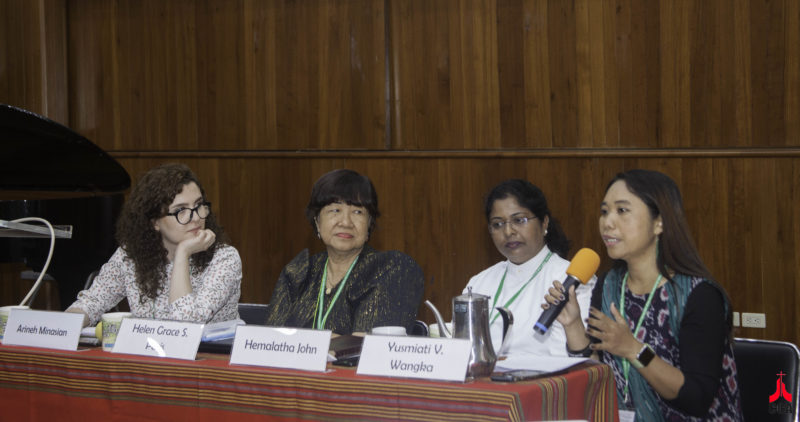Collective participation of Asian women in struggle for peace with justice required for reconciliation process
 Panel presentation on ‘Towards Participation and Solidarity in Struggle for Peace with Justice’
Panel presentation on ‘Towards Participation and Solidarity in Struggle for Peace with Justice’
HSINCHU, Taiwan: Analysing and presenting their respective contexts of struggle for peace with justice and women’s participation in certain Asian situations, four panellists stressed the need for collective engagement in advocacy in the session on ‘Towards Participation and Solidarity in Struggle for Peace with Justice’
Helen Grace Salatandre Paris from the United Church of Christ in the Philippines stressed on the need for Asian countries to ‘develop own remedies for conflict management and resolution to pursue justice, contain conflict and replace violence and war with peaceful and effective means to address injustices and resolve disputes’.
Helen Grace reiterated that solidarity required that people think and act in terms of the obligations as members of a global community, despite differences of race, religion, or nationality.
“We are responsible for actively promoting the dignity of the world’s poor through global economic reform, development assistance, and institutions designed to meet the needs of the hungry, refugees and the victims of war. Solidarity, the Bible reminds us, contributes to peace by providing a ‘firm and persevering determination’ to seek the good of all," she said.
Rev Hemalatha John from the Church of South India based her presentation on the rereading of the Scripture from a womanist perspective to reveal the role of women and men in violence and peace.
“The need of the hour today is the discerning ability of the Wise Woman as in the book of II Samuel. We live in a world filled with war and conflicts; women from every city must take courage to initiate and participate in conversations during antagonizing situations and people”, explained Rev Hemalatha.
Focusing on women in labour migration and the multi-layer struggles of migrant domestic workers in Hong Kong, Yusmiati Vistamika Wangka, who works among migrant women workers in Hong Kong shed light on the struggles of migrant workers as well as the factors that affect the feminization of migration to Hong Kong.
Touching on the role of the Church in this matter, Yusmiati encouraged churches to raise awareness about migrant workers issues and disseminate information about safe migration and the risk of human trafficking.
“I invite churches in Asia to take action against the injustice that continues to occur among women migrant workers. Labour migration is an Asian reality and a living theology in Asia should also include a theology of solidarity with migrants”, said Yusmiati Vistamika Wanga.
The panel presentation session was moderated by Arineh Minasian from the Armenian Apostolic Church in Iran (The Prelacy of Armenians in Isfahan and Southern Iran)










